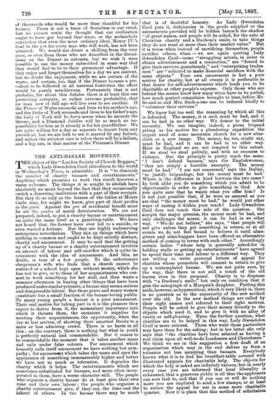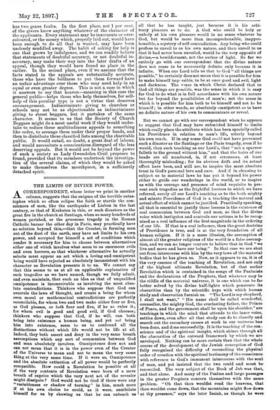THE ANTI-BAZAAR MOVEMENT. T HE object of the "London Society of
Church Beggars," which Lady Gwendolen Cecil introduces to the world in Wednesday's Times, is admirable. It is " to diminish the number of charity bazaars and entertainments." Anything which promises to work this result deserves a warm welcome. The things it is sought to abolish have absolutely no merit beyond the fact that they occasionally enrich a deserving institution with a part of their receipts. But they do so only as the lessees of the tables at Monte Carlo may, for aught we know, give part of their profits to the poor. Against the pro of accidental benefit must be set the contra of moral deterioration. We are not prepared, indeed, to put a charity bazaar or entertainment on quite the same level as a gambling-table. We have not heard that the former have ever led to a suicide, or even wasted a fortune. But they are highly undeserving enterprises nevertheless. They mix up things which have nothing in common and ought to be kept strictly distinct, charity and amusement. It may be said that the getting up of a charity bazaar or a charity entertainment involves an amount of labour and self-sacrifice which is quite in- consistent with the idea of amusement. And this, no doubt, is true of a few people. To the unfortunate clergyman's wife who finds that a church cannot be restored or a school kept open without money, which she has not to give, or to those of her acquaintances who con- sent to work something for her stall, and then waste a summer afternoon in buying other things that have been produced under similar pressure, a bazaar may seem a serious and disagreeable labour. But these grave and weary women constitute but a small fraction of the bazaar-loving public. To many young people a bazaar is a pure amusement. Their real motive for taking part in it is the pleasure they expect to derive from it, the momentary importance into which it thrusts them, the occasions it supplies for meeting their acquaintances, the opportunity, when the day at last arrives, of showing their smartest frocks to a more or less admiring crowd. There is no harm in all this ; on the contrary, there is nothing but what in youth is perfectly natural and commendable. But it ceases to be commendable the moment that it takes another name and sails under false colours. For amusement which honestly calls itself amusement we have nothing but sym- pathy ; for amusement which takes the name and apes the appearance of something immeasurably higher and better we have not so much as toleration. It degrades the charity which it helps. The entertainments which are sometimes substituted for bazaars, and more often incor- porated in them, have a worse character still. The people who organise a charity bazaar do at least give their own time and their own labour ; the people who organise a charity entertainment give, if they can, the time and the labour of others. In the bazaar there may be much that is of doubtful honesty. As Lady Gwendolen Cecil puts it, deficiencies in the goods supplied or the amusements provided will be hidden beneath the shadow " of great names, and people will be asked, for the sake of Christian charity and a Duchess's smile, to take things they do not want at more than their market value." But it is worse when instead of sacrificing themselves, people sacrifice others, when — we are again quoting Lady Gwendolen Cecil—some "struggling artists, in order to obtain advertisement and a connection," are "forced to give their services gratuitously," and "enterprising trades- men" are " solicited to make financial sacrifices with the same objects." Your own amusement is but a poor motive for charity, but at all events it is preferable to that desire for self-advertisement which leads you to be charitable at other people's expense. Only those who are behind the scenes know how many wires have to be pulled, how much genteel compulsion brought to bear, before Mr. So-and-so and Mrs. Such-a-one can be induced kindly to " volunteer their services."
We know but too well the reasoning by which all this is defended. The money, it is said, must be had, and it can be had in no other way. We demur to the initial necessity. We can imagine, indeed, a pious brigand giving as his motive for a plundering expedition the urgent need of some mountain church for a new altar- cloth or a new image. The money, he, too, might say, must be had, and it can be had in no other way. Here in England we are not tempted to this extent. If we steal we steal politely, and with no recourse to violence. But the principle is pretty much the same.
I don't defend bazaars,' says the Englishwoman, ' they are simply a horrible necessity. The money must be had.' I am not concerned,' says the Italian, to justify brigandage, but the money must be had.' Where is the difference in kind between the two cases ? In both alike you do something which you admit to be objectionable in order to give something to God. Are you quite sure that he wants what you offer him ? Is it not just possible that, if he were as assured as you are that " the money must be had," he would put other ways of raising it within your reach? Lady Gwendolen Cecil does not touch this side of the question. She accepts the major premiss, the money must be had, and only challenges the minor, it can be had in no other way. " We do not believe," she says, " that people will not give unless they get something in return, or at all events we do not feel bound to believe it until alms- givers and alms-beggars have been offered an alternative method of coming to terms with each other." Accordingly certain ladies " whose help is generally asked-for in holding stalls or getting up entertainments" have agreed to spend their time and labour in a different way. They are willing to write personal letters of appeal for charities whose promoters will consent in return to give up a contemplated bazaar. We are not quite sure, by the way, that there is not still a touch of the old leaven even in this proposal. Charity is to dispense with " a Duchess's smile," but only on condition that it gets the autograph of a Marquis's daughter. Patting this aside, however, as hypercritical, which it very likely is, there is no question as to the superiority of the new method over the old. In the new method things are called by their right names and referred to their right motives. People will be asked. to give their money directly to the objects which need it, and to give it with no alloy of vanity or self-pleasing. -Upon the further question, what charities are to be helped in this way, Lady Gwendolen Cecil is more reticent. Those who want these particulars may have them for the asking; but in her letter she only says that " the charities have been selected as having a real claim upon all well-to-do Londoners and Churchmen." We think we see in this suggestion a first draft of an organisation which may in the end deliver us from a nuisance not less annoying than bazaars. Everybody knows what it is to find his breakfast-table covered with illustrated appeals for charitable help. The objects for which the help is asked are infinitely various, but in nearly every case you are informed that local liberality is exhausted, that a generous public is all that the applicants can now look to, and that if you can or will do nothing more you are implored to send a few stamps, or at least to return the appeal for use in some more charitable quarter. Now it is plain that this method of solicitation has two grave faults. In the first place, not 1 per cent. of the givers know anything whatever of the character of the applicants. Every statement may be inaccurate or over- coloured, or the money which, properly laid out, would have been enough to do all that is wanted, may have been uselessly muddled away. The habit of asking for help is one that grows by indulgence, and we can readily believe that statements of doubtful accuracy, or not doubtful in- accuracy, may make their way into the later drafts of an appeal, though they would have found no place in the earlier. In the second place, even if we assume that the facts stated in the appeals are substantially accurate, those who have the boldness to put them forward have an unfair advantage over those who may need help in an equal or even greater degree. This is not a case in which it answers to say that heaven—meaning in this case the general public—helps those who help themselves, for self- help of this peculiar type is not a virtue that deserves encouragement. Indiscriminate giving to churches or schools may not be as objectionable as indiscriminate giving to street beggars, but it partakes of the same character. It seems to us that the Society of Church Beggars might do a most useful work if they would under- take to reduce these multitudinous appeals to something like order, to arrange them under their proper heads, and then to distribute these classified lists among the charitable public. It would entail, no doubt, a great deal of labour, and would necessitate a conscientious disregard of the less deserving appeals. But it would not be beyond the power of such a society as Lady Gwendolen Cecil proposes to found, provided that its members undertook the investiga- tion of the several claims, of which they would be asked to make themselves the mouthpiece, in a sufficiently detached spirit.







































 Previous page
Previous page